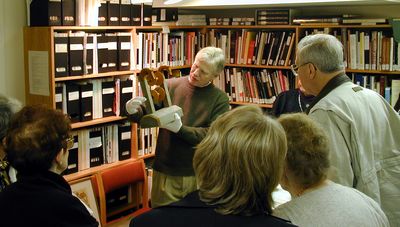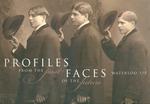Michael Bird
Michael Bird was a university professor who spent many hours driving
around the local countryside while his contemporaries combed library
book stacks. It was his passion for folk art that took him into farm
kitchens for the stories behind an elaborate butter press or an embroidered towel.
Bird, who taught everything from religion to art and film for 34 years at the University of
Waterloo’s Renison College, wanted to know every detail about the Germanic folk art he
collected.
“In recording and remembering minutiae about each piece, he revived and kept alive the
work of many fine artists from this region who would otherwise have remained totally
anonymous in the greater collecting world,” said Susan Burke, the curator at Joseph
Schneider Haus in Kitchener.
Bird, who died suddenly of heart failure in 2003, left a legacy of scholarly research and
folk art collections to enrich the lives of both serious students and the simply curious. His
greatest contribution was his knowledge about Pennsylvania German fraktur, a form of
calligraphy. “He took a childlike delight in what he found, seeing beauty even in the
functional pieces,” it was once written.
He began collecting in the early 1970s and by 1984 had assembled a collection of 640
pieces of folk art, primarily from the Waterloo region. Bird then donated this huge, wellresearched “Canadian Harvest” collection to the Joseph Schneider Haus. After his death,
the Schneider Haus mounted an exhibition of the finest pieces from the collection to
commemorate Bird’s generosity.
As a professor of religious studies and fine art, he wrote several books including
Canadian Folk Art: Old Ways in a New Land (1983) and A Splendid Harvest: Germanic
Folk and Decorative Arts in Canada (1981). His final book, O Noble Heart (2002)
examined the spirituality of fraktur.
Bird was also a passionate teacher who was known to sit with his laptop computer in the
dining hall so that he would be accessible, and it was once written that, “He was always,
inevitably, surrounded by students.” Bird was also an accomplished pianist who put
himself through university by playing jazz at roadhouses.
A story that highlights his dedication to his students occurred in the summer before he
died. He was concerned about the dearth of good textbooks for a course, so he wrote one
– a 240 page manuscript that was ready for students in the fall term.
Bird was born in the small community of Belle Plaine, Iowa in 1941. He graduated with
a PhD from the University of Iowa after taking a wide variety of courses including
physics, cinema, art and literature in his undergraduate years.
“His courses were always eclectic, and his students loved them and him. Together they
learned what it meant to study sacred places, take journeys, quests and pilgrimages,
investigate religion and art, labyrinths and mazes, religion and film,” his obituary read.
Photo courtesy of Region of Waterloo Joseph Schneider Haus
Michael Bird (Waterloo 150 Profile)
Description
- Creator
- Gallagher, Beth, Author
- Media Type
- Text
- Image
- Description
- To celebrate Waterloo's 150th anniversary, the Waterloo Public Library published a book called "Profiles from the Past, Faces of the Future." This book featured 150 profiles of people who helped make Waterloo what it is today. This is the digitized profile for Michael Bird.
- Notes
- Please visit the Waterloo Public Library to enquire about physical copies of "Profiles from the Past, Faces of the Future."
The Waterloo 150 project was funded by a grant from the Waterloo Regional Heritage Foundation. Beth Gallagher wrote the profiles with the assistance of many research volunteers. Information for the profiles was gathered from a variety of sources from the community and the Ellis Little Local History Room. Notable sources include the Ellis Little Papers, newspaper clippings, local magazines and books. - Place of Publication
- Waterloo, Ontario
- Date of Publication
- 2007
- Subject(s)
- Personal Name(s)
- Bird, Michael ; Burke, Susan
- Language of Item
- English
- Geographic Coverage
-
-
Ontario, Canada
Latitude: 43.4668 Longitude: -80.51639
-
- Copyright Statement
- Uses other than research or private study require the permission of the rightsholder(s). Responsibility for obtaining permissions and for any use rests exclusively with the user.
- Contact
- Waterloo Public LibraryEmail:askus@wpl.ca
Website:
Agency street/mail address:35 Albert Street, Waterloo, Ontario, Canada, N2L 5E2
- Full Text




